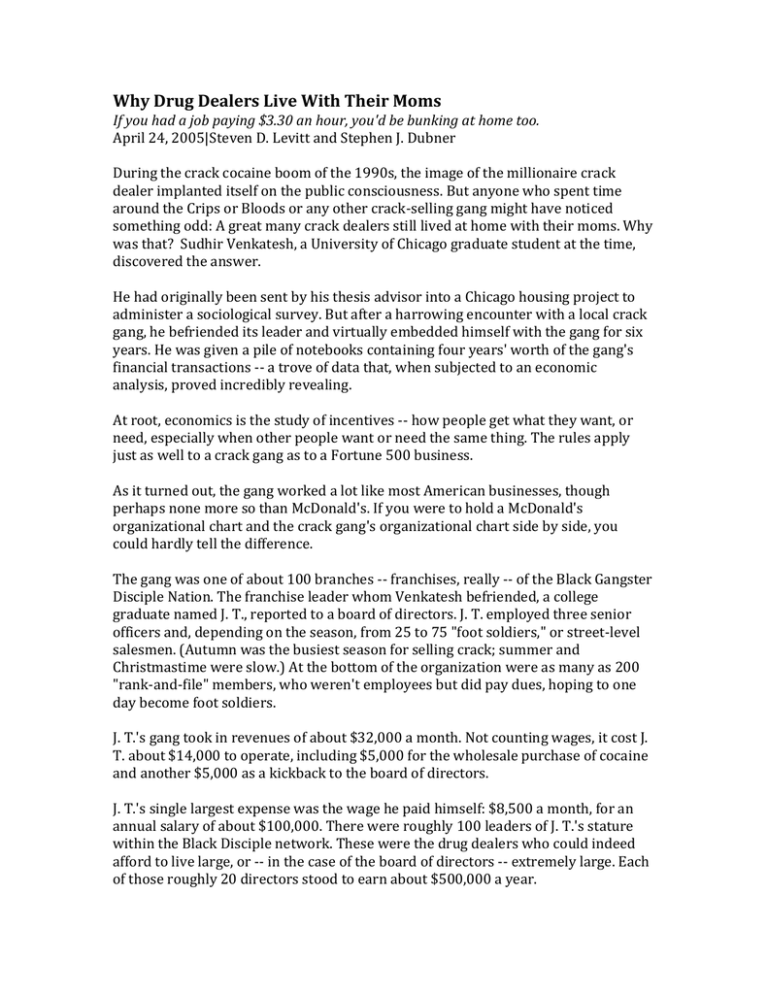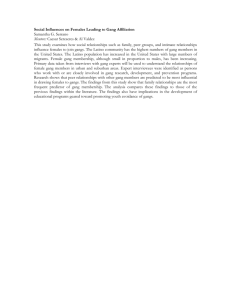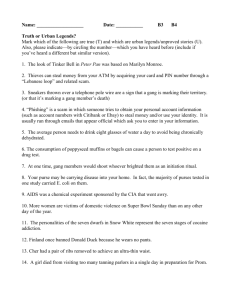Why Drug Dealers Live With Their Moms
advertisement

Why Drug Dealers Live With Their Moms If you had a job paying $3.30 an hour, you'd be bunking at home too. April 24, 2005|Steven D. Levitt and Stephen J. Dubner During the crack cocaine boom of the 1990s, the image of the millionaire crack dealer implanted itself on the public consciousness. But anyone who spent time around the Crips or Bloods or any other crack-selling gang might have noticed something odd: A great many crack dealers still lived at home with their moms. Why was that? Sudhir Venkatesh, a University of Chicago graduate student at the time, discovered the answer. He had originally been sent by his thesis advisor into a Chicago housing project to administer a sociological survey. But after a harrowing encounter with a local crack gang, he befriended its leader and virtually embedded himself with the gang for six years. He was given a pile of notebooks containing four years' worth of the gang's financial transactions -- a trove of data that, when subjected to an economic analysis, proved incredibly revealing. At root, economics is the study of incentives -- how people get what they want, or need, especially when other people want or need the same thing. The rules apply just as well to a crack gang as to a Fortune 500 business. As it turned out, the gang worked a lot like most American businesses, though perhaps none more so than McDonald's. If you were to hold a McDonald's organizational chart and the crack gang's organizational chart side by side, you could hardly tell the difference. The gang was one of about 100 branches -- franchises, really -- of the Black Gangster Disciple Nation. The franchise leader whom Venkatesh befriended, a college graduate named J. T., reported to a board of directors. J. T. employed three senior officers and, depending on the season, from 25 to 75 "foot soldiers," or street-level salesmen. (Autumn was the busiest season for selling crack; summer and Christmastime were slow.) At the bottom of the organization were as many as 200 "rank-and-file" members, who weren't employees but did pay dues, hoping to one day become foot soldiers. J. T.'s gang took in revenues of about $32,000 a month. Not counting wages, it cost J. T. about $14,000 to operate, including $5,000 for the wholesale purchase of cocaine and another $5,000 as a kickback to the board of directors. J. T.'s single largest expense was the wage he paid himself: $8,500 a month, for an annual salary of about $100,000. There were roughly 100 leaders of J. T.'s stature within the Black Disciple network. These were the drug dealers who could indeed afford to live large, or -- in the case of the board of directors -- extremely large. Each of those roughly 20 directors stood to earn about $500,000 a year. So the top 120 men on the Black Disciples' pyramid were paid very well. But the pyramid they sat atop was gigantic. Using J. T.'s franchise as a yardstick -- three officers and roughly 50 foot soldiers -- there were about 5,300 other men working for those 120 bosses. Then there were the 20,000 unpaid rank-and-file members, many of whom wanted nothing more than a chance to become a foot soldier. And how well did that dream job pay? About $3.30 an hour. J. T.'s three officers didn't do much better: about $7 an hour. So the answer to the original question -- if drug dealers make so much money, why are they still living with their mothers? -- is that, except for the top cats, they don't make much money. They have no choice but to live with their mothers. A crack gang works pretty much like the standard capitalist enterprise: You have to be near the top of the pyramid to make a big wage. But selling crack is a lot more dangerous than most menial labor. Anyone who was a member of J. T.'s gang for the four years covered in the notebooks stood a 1-in-4 chance of being killed. That's more than five times as deadly as being a timber cutter, which the Bureau of Labor Statistics calls the most dangerous job in the United States. So if crack dealing is really the most dangerous job in America, and it pays less than minimum wage, why on Earth would anyone take such a job? Well, for the same reason a pretty Wisconsin farm girl moves to Hollywood. For the same reason that a high school quarterback wakes up at 5 a.m. to lift weights. They all want to succeed in an extremely competitive field in which, if you reach the top, you are paid a fortune (to say nothing of the attendant glory and power). But in each of these glamour professions, the same problem exists: A lot of people are competing in what is essentially a tournament. Earning big money in J. T.'s crack gang wasn't much more likely than the Wisconsin farm girl becoming a movie star or the high school quarterback playing in the NFL. But criminals, like everyone else, respond to incentives.





